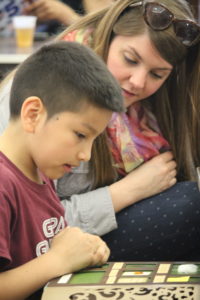 Middle school teacher Katy Ramon believes that positive encouragement is the best way to keep control over her classroom. As children enter her 8th grade class at the Gardner Pilot Academy, she thanks them each personally for sitting down quickly and beginning the day’s problem, a non-linear pattern displayed on a projector. “I’ve noticed that me saying, ‘sit down, take out your stuff, get started’, is less effective than me noticing the students who are doing the right thing and just illuminating that,” she said. “I just have to say, ‘good job’ to one or two students and the rest immediately fall in line, which shows us that they really want to do the right thing.”
Middle school teacher Katy Ramon believes that positive encouragement is the best way to keep control over her classroom. As children enter her 8th grade class at the Gardner Pilot Academy, she thanks them each personally for sitting down quickly and beginning the day’s problem, a non-linear pattern displayed on a projector. “I’ve noticed that me saying, ‘sit down, take out your stuff, get started’, is less effective than me noticing the students who are doing the right thing and just illuminating that,” she said. “I just have to say, ‘good job’ to one or two students and the rest immediately fall in line, which shows us that they really want to do the right thing.”
The class continues after the morning problem with an assessment performed on laptops. This allows Katy to follow each student live as they work on the problems, offering them encouragement on the ones they got correct. It all feeds into the loop of positivity, and it’s designed to prevent students from giving up on problems. “I notice that when students notice I’m looking at their work they try harder on assessments,” she said.
Katy’s philosophy, that a little encouragement and confidence can boost a student’s desire to perform well, is shared by Boston Partners in Education, which is why she made an extra effort to ensure that our one-on-one mentoring program was open to middle schoolers at the Gardner Pilot Academy.
Katy previously had some experience with Boston Partners’ academic mentors while she was a teacher at the Frederick Pilot School. “I was really struck by them because they were tutors that really knew the content, which is not something you typically see,” she said. She was also impressed with their professionalism and consistency—the way Boston Partners’ volunteers communicated with her in cases when they were not able to make it.
The only Boston Partners program present at the Gardner when Katy first began was Power Lunch, which was being offered to the younger students. Lauren Lafferty, Director of Extended Services at Gardner Pilot Academy, has seen the successes of the program. “In the nature of our school, it was a really great fit,” said Lafferty. “Students are in the program for first, second, and third grade, and many of their volunteers return each year,” Lafferty continued, “which has been really positive for students.”
Two students who were struggling were able to work with same volunteers for three years. One child’s parents were going through a complicated divorce, and socially, he struggled to connect with other students. His Power Lunch volunteer, an older woman in her 50s, was able to make a connection with him. “He could not wait for her to come every week,” Lafferty said. Another student had a diagnosed anxiety disorder, “He was highly anxious, and also struggling socially, but he really connected with his volunteer,” she said. “They continued to come, and we got special permission for them to continue because of their great work, and because of how powerful those sessions were for the student.”
So, when Katy suggested meeting with our staff this year about introducing the one-on-one mentoring to their burgeoning middle school program, the response was very positive. “They [the staff] spoke to all of our middle school teachers and really walked us through how you nominate a student, and how the tutors or academic mentors are selected and trained,” she said.
Katy is very enthusiastic about the three academic mentors in her class. The first, Gabby, works with an ESL student with low self-esteem. “He gives up very easily and just disengages. I wanted him to work with Gabby, and when she came the first time, he was so excited,” she said. Katy says they sit at a back table and both participate in class, but Gabby is there to help walk him through each problem. “When Gabby’s here, he raises his hand more than I ever see him raise his hand to volunteer and engage with the class, so that’s pretty cool.”
Another mentor, Richard, puts in a lot of extra effort into his time with his student. “What I really like about Richard is he’ll send me an e-mail the next day or that evening with two or three misconceptions that he saw, and that’s outstanding,” Katy said. “That goes above and beyond.” Because of his feedback, she is able to create learning opportunities or worksheets specifically catered to that student and the skills he/she needs to develop.
Katy’s third academic mentor is Lily, a younger woman not-native to Boston, who is using the academic mentorship as a way to become a part of the community. Her student gets tired a lot, and often puts her head down after 15 minutes of class. When Lily comes, [the student] says, “I think that’s enough,” but Lily is able to push her to keep trying. “They get through a lot more work than [the student] ever gets through alone in class,” said Katy.
For Katy, Boston Partners has been able to fill out a niche for one-on-one mentoring that can build the confidence of her students, calibrate the methods used to educate them, and build positive relationships between students and adults. As Boston Partners’ partnership with the Gardner Pilot Academy continues to blossom, thanks in part to Katy’s dedication, there is hope that soon all teachers will benefit from academic mentors. “I do believe there are three teachers taking advantage of the academic mentors, and we only have about seven, so hopefully next year that will increase a little bit,” Katy said.
